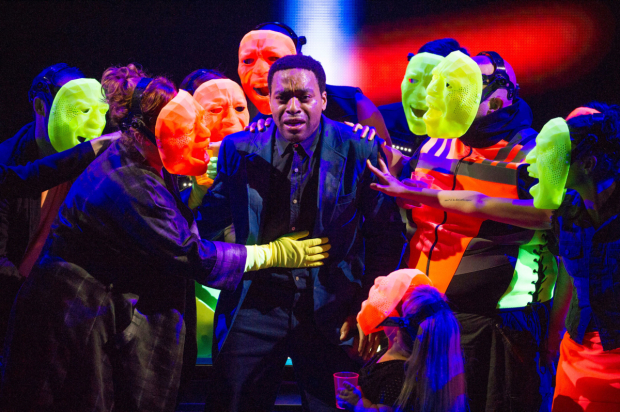Everyman (National Theatre Olivier)

© Richard Hubert Smith
Rufus Norris opens his personal account as the National’s artistic director with a vivid retrieval of the medieval morality play Everyman as a contemporary parable of waste and selfishness in a hedonistic consumer society.
And he’s called up two trusted colleagues for invaluable assists: Chiwetel Ejiofor in the title role of a high-flying city trader who falls off the roof at his fortieth birthday party – the image on stage is of the plunging man at the Twin Towers; and poet laureate Carol Ann Duffy, who provides this new narrative background and transforms the austerity of the anonymously written original into a sort of early draft for Peer Gynt, with scenes of poverty and natural disaster.
In this newly defined epic, God is of course a woman, and she’s first seen – in the charlady shape of a bedraggled Kate Duchêne – disconsolately sweeping the stage and asking the audience as the lights dim, "Had a good day?" As part of this non-hierarchical approach, God doubles with Good Deeds, the one virtue of any help to the doomed hero. Death, too, shambles on as an overworked Irish mortician in a white onesie, played with a shrug and a beautifully inflected insouciance by Dermot Crowley.
"This is sick," protests Everyman (or "Ev" as he’s known to his friends) to which Death unsurprisingly responds, "Sic transit gloria mundi." We never hear the famous line of Knowledge – "Everyman I will go with thee and be thy guide, in thy most need to go by thy side" – because the character played by Penny Layden is drunk on a rubbish dump. "Welcome to hell, SE1," she jeers, whipping out a prosthetic penis for a leak. No need to add that Duffy’s rewrite is total, her rhymes much racier, her religiosity satirical – but effectively moving at the end.
The momentum in the first half (no interval) is physical, in the second, spiritual, with Ev’s lifestyle exposed in the orgiastic party, choreographed by Javier de Frutos as a series of rap and club dances against the fractured large-screen video projections of Tal Rosner. The long table serves for a suitably cutting edge company coke sniff as elegant as any Sadler’s Wells European import.
Norris has long commanded the Olivier’s open spaces with a principle of creating material imagery in the void. So, Ian MacNeil’s brilliant design is populated with a suspended display of Anthony Gormley-like human figures, the rubbish dump is a giant caterpillar of multi-coloured garbage bags and a tsunami disaster is created with a terrifying wind machine wheeled around the stage shredding paper (Tessa Ross internal memos, perhaps?) that flies into our faces.
Ejiofor is a commanding, sympathetic presence in the middle of this energetic and seductive spectacle, especially when he sees his younger self scooting around the stage, or visits his parents (the formidable Sharon D Clarke and jumpily disintegrating Philip Martin Brown) and lesbian sister (Michelle Butterly) in a scene that develops a brief encounter into a full-on dysfunctional family playlet.
There is police accident tape and a consort of musicians and richly layered singing from the chorus of sense and virtues – who include eye-catching Nick Holder as medieval Strength and Clemmie Sveass as thoroughly modern Insecurity – that juggle a few comparisons with London Road; but William Lyons’s music is richly varied in a different way, the singing similarly superb and the masks and costumes (by Nicky Gillibrand) a riot of colour, shiny surfaces and witty detail.
Everyman runs at the National Theatre Olivier until 30 August











